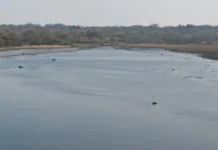So far in my column in previous editions I have looked at how Religion and industry has shaped Llanelli and its people. This month I will be analysing the Llanelli Riots and discussing the conditions that led the people to go out to the streets and cause chaos for seven hours and take part in a riot.
The industrial revolution brought plenty of manufacturing jobs to our town. However, by the 1900, poverty was strife due to insecure employment and low wages; poor sanitation and limited health care were contributing factors to a feeling of discontent in Llanelli.
The Trimaran miners were the first strike. This strike is important because it was the first action in a chain of events that resulted in the death of six Llanelli residents and chaos in the streets. It was the gasworks employees that were next to threaten strike action. They demanded a minimum wage to compensate them for the rise in the cost of living. If wages were not keeping up with the cost of living then it meant that workers were becoming poorer. Seamen and dockers were the next to strike. It would seem that every nearly all of industry was at a standstill in Llanelli. The first national railway strike happened nationwide. This strike proved the tipping point that directly caused the Llanelli Riot. The railway workers formed picket lines at the two station gates in Llanelli on the 17th August 1911. Workers on strike bonded together to work towards a common goal of better pay and working conditions. The Tinnies (tin workers) of Llanelli soon joined the railway workers on the picket lines.
The trouble started almost immediately when 127 soldiers of the North Lancashire Regiment arrived in the town to ensure that the trains passed through safely. The soldiers positioned themselves at each set of gates. However, the trains that did make it through were attacked with stones by those on strike. The strikers managed to board a train that came from Cardiff and was set to travel to West
Wales. Although, minutes later the soldiers were ready with their rifles and bayonets fixed to disperse the strikers. The strikers viewed this as a provocation and responded by arming themselves with stones and hurled them at the soldiers. This proved to be fatal for the strikers as the soldiers were ordered to fire into the crowd. This killed two Llanelli strikers, seriously injured one and a fourth had a gunshot to the hand.
This disorientated the strikers and they temporary disbanded. By the evening, however, the strikers banding back together and they were angry at the terrible injustice that occurred earlier. The strikers has now turned into rioters as they began looting shops and attacking the houses of people who had links to the railway. The rioters demonstrated their anger towards the army by destroying and looting vans that carried military kit and provisions.
The anger that the Llanelli Rioters felt towards the military could be justified because they shot and killed unarmed civilians. However, by looting small businesses the rioters were showing themselves to be nothing more than opportunists that went out thieving whilst using the deaths of the strikers as justification for their actions. The rioters were also responsible for four more deaths as they set alight a truck that exploded. The deaths might have been an unwanted consequence of their actions but the rioters were now responsible for more deaths than the soldiers who fired at them. The moral high ground they could have held over the soldiers disappeared once they looted from innocent victims and killed the four men from the explosion. For seven hours Llanelli was witnessing carnage on the streets that had never been experienced and will probably never happen again.
Keir Hardie, who founded the labour party, wrote a pamphlet following the Llanelli Riot that condemned the use of armed forces to resolve conflicts in industrial confrontations. A grave injustice occurred when soldiers fired upon unarmed civilians and it was this
action that for seven hours on the 19th August 1911 the streets of Llanelli erupted into carnage.
Help keep news FREE for our readers
Supporting your local community newspaper/online news outlet is crucial now more than ever. If you believe in independent journalism, then consider making a valuable contribution by making a one-time or monthly donation. We operate in rural areas where providing unbiased news can be challenging. Read More About Supporting The West Wales Chronicle
























